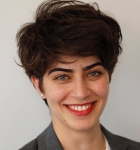The Forgotten Adolescent Syrian Refugees; Who Can They Turn To?
By Salma Taleb
Since the beginning of the Syrian war in late 2011, more than 4.8 million Syrians have escaped to Lebanon, Turkey, Jordan, Iraq, and Egypt. While a few thousand of them made it through some of the most dangerous ways to Europe, the majority remain living in refugee camps and informal settlements in the neighboring countries. International human rights organizations and the United Nations work to provide the basic needs to the refugees. However, there remains a serious gap in any relief provided or attention given to the adolescent Syrian refugees, between the ages of 12–19 years-old, who fall outside the age limit to be considered as children, yet are unable to protect nor care for themselves as adults, which result in loss and identity crisis for those adolescents.
While it is reasonable to prioritize relief for women and young children, as they are more vulnerable to poverty and exploitation than men, the issue resides in the fact that adolescent Syrian refugees are almost forgotten. Adolescents are never prioritized and do not receive special support regardless of their vulnerability to being victims of sexual violence, early marriages, radicalizations and recruitment by terrorist groups. This lack of attention towards adolescents, given their youth, trauma, and poverty, generates long and short term challenges and losses not only for them, but also for the host countries and the countries they may relocate to in the future.
For example, currently in Lebanon about 20–25% of the population is made up of Syrian refugees, 300,000 of whom are adolescent girls and 91% of those girls aged 15–19 are out of school. There are only a few local and international organizations like Basmeh & Zeitooneh and Mercy Corp that have special empowerment programs targeting Syrian and Lebanese adolescents. These organizations provide spaces for adolescents to connect with each other, build a community and learn through using arts. Nonetheless, these two organizations are unable to accommodate the current needs in Lebanon. Similarly, as a country hosting more than a million Syrian refugee across three refugee camps, Jordan only provides four adolescent targeted spaces which are all situated in one camp.
This lack of attention and support causes issues deeper than the adolescents’ current lack of education and illiteracy. It is an issue of identity and purpose to a generation growing with none! Though the immediate effects include working in dangerous, low paid jobs, there are more profound consequences that differ based on the adolescent’s gender. Girls become victims of early child marriages and its accompanying mental and physical complexities, human and sex trafficking, and sexual and gender based violence. Meanwhile, boys become targeted for recruitment by the terrorist groups fighting in Syria, vulnerable to religious radicalization that gives them the purpose they lack in their lives.
Had the war not broken out in Syria, these adolescents would at minimum have been attending mandatory schooling until the ninth grade. Girls would not have been married at such a youthful age and boys would have, in the worst-case scenario, worked a blue-collar job and lived with their families. However, because they have lived in refugee camps and informal settlements for years with their essential needs unmet, it became reasonable for adolescents to marry young and escape being a burden on their families or to join terrorist groups that pay them well to throw bombs and be lookouts.
Adolescents growing under these conditions are losing their identity and all the hope they might have had. When you lose your home, your country, and many of your family members, you lose your faith in humanity and your purpose in life. Without support, legal protections, and any sense of belonging to the host county, losing yourself becomes a natural next step. These adolescents have known war for about half of their lives. Survival became their goal. Being a forgotten stranger in a foreign country became their identity.
Between escaping a war-torn country and the violence in it, and the harsh reality refugees live in with poverty, humiliation, and lack of education, adolescents become purposeless. Focusing on their survival and losing sight of their future, they ultimately lose sight of themselves. Just like their peers in other parts of the world, these adolescents have a right to their future and to live in peace. The international community and relief agencies have a duty to prioritize these innocent adolescents, to protect their future, and to help them find their identity and purpose again.
 Salma Taleb, was born and raised in Syria. In 2008, she moved to North America, first to Canada then to the United States where she obtained a B.A. in Communication and Philosophy from the University of Minnesota.
Salma Taleb, was born and raised in Syria. In 2008, she moved to North America, first to Canada then to the United States where she obtained a B.A. in Communication and Philosophy from the University of Minnesota.
In 2014, she published an Arabic novel titled Lan Tamout (English translation: Will not Die) in which she discussed women and children rights, political corruption, and social oppression in the Middle East and Syria. Salma also publishes various short stories and Op-ed articles, both in Arabic and English, on the same topics as well as on immigration issues.
In addition to her writing, Salma has presented on issues of Human Rights in Syria and the Arabic language and literature at the University of Minnesota, Northwestern University Pritzker School of Law, and the University of Chicago. She is currently finishing her Juris Doctor degree (J.D.) at Northwestern University where she concentrates on International Law.


Leave a comment